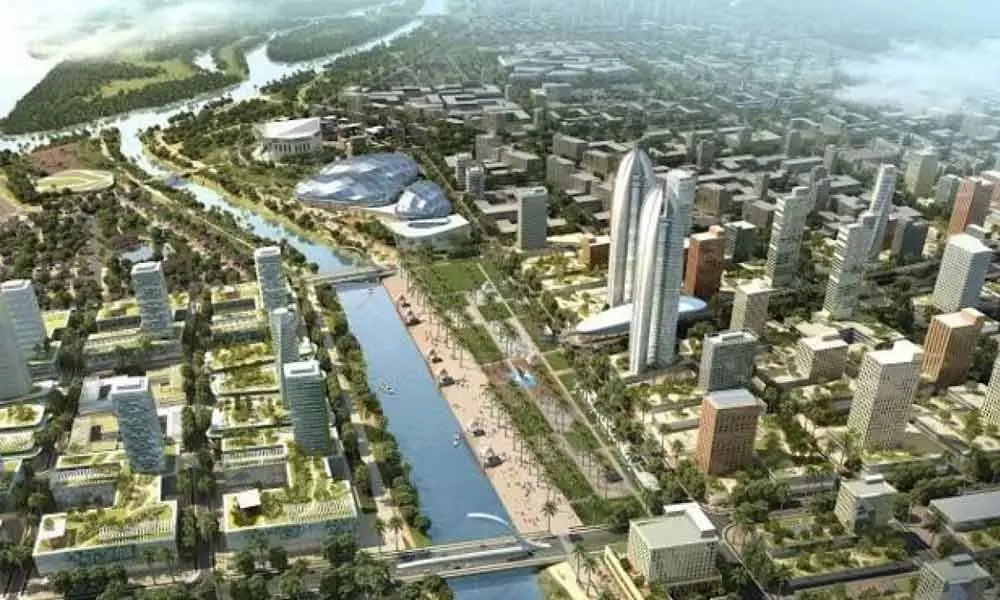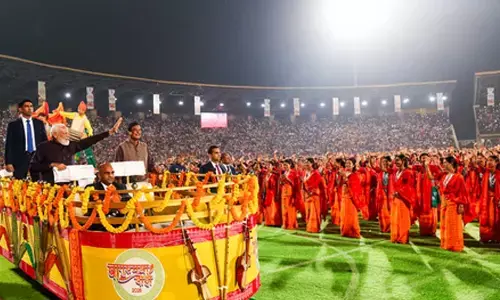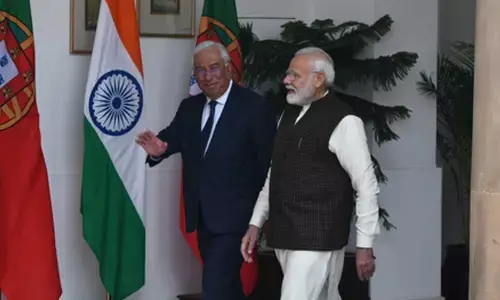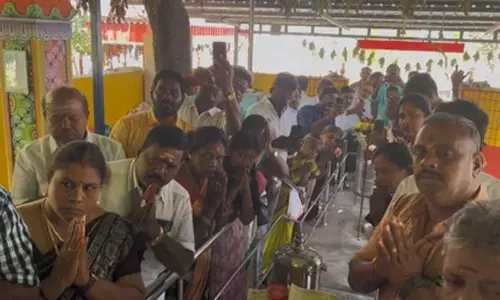Can't AP's capital building process wait?

The announcement, a few days ago, by the Chief Minister of Andhra Pradesh, that the State would shortly have three capitals, has set off a lively and heated debate, especially in the political, legal and business circles.
The announcement, a few days ago, by the Chief Minister of Andhra Pradesh, that the State would shortly have three capitals, has set off a lively and heated debate, especially in the political, legal and business circles.
The hasty, if not clumsy, way in which the erstwhile Andhra Pradesh was divided into two Telugu speaking States of today, gave rise to a large number of worrisome issues.
Not the least important of them was the question of deciding upon a capital city for the new State of Andhra Pradesh.
Following the somewhat half-hearted measure of declaring Hyderabad as a common capital for the first ten years, a decision was taken to locate the capital between Vijayawada and Guntur cities – at Amaravati.
What any State requires, essentially, is a place from which its Legislature, Judiciary and Executive can function. So long as a place, and its location, satisfy the demands of functional requirements, the name it carries should really be of no consequence.
After all – did not Shakespeare say, "What's in a name? That which we call a rose by any other name smells as sweet"?
Needless to say, all three can be together or in different places. The cities of Pune, which houses the offices of the heads of many departments of the State, and Nagpur, where a bench of the Bombay High Court is located, in Maharashtra State, for instance, are good examples of how such a dispensation works.
So are Kanpur, where, again, offices of some Heads of Departments of the State of Uttar Pradesh located, and Allahabad, which is where the High Court of that State is located.
And the Chief Minister of Andhra Pradesh has, himself, quite appropriately cited the example of South Africa. And, if the chosen places are functioning cities, there is really no reason why existing accommodation cannot be used to house them.
The need, therefore, felt by some political leaders, to "construct" a capital city has always left this columnist totally puzzled. For one thing, existing buildings in existing places can easily be used.
At the best, perhaps, if the need is being acutely felt, new buildings can always be put up in those places. And, surely, there can really be no compelling reason why all three wings of the State or, for that matter, different departments of the government, for instance, should all be in one place in the geographical sense.
Particularly in the digital era in which we have the good fortune to live. That being the case, the justification of construction of a new capital is understandably difficult to find.
Which is the reason why one was even more surprised when such an idea was mooted by political leaders known to be champions of the use of Information Technology in administration.
Just as the idols in Hindu temples are said to be of two varieties, namely, those installed and those born on their own, cities are also generally of the same variety – those which were constructed from scratch according to a plan, and those that have evolved into what they are today.
In fact, in modern India, there are only seven instances of cities having been built afresh, including Jamshedpur to begin with, and Naya Raipur being the latest.
That all those were built with a great deal of foresight and careful planning, and are now flourishing as almost ideal urban agglomerations, is a different story altogether.
Coming back to the point, one finds it extremely difficult to appreciate the need for constructing a capital city in States with highly developed urban agglomerations, such as Andhra Pradesh.
Any of the existing urban centres can respond efficiently to the demands of housing the three wings of the State, or government departments.
One recalls in this connection the speed and efficiency with which the government went about the task of kickstarting the functioning of a new capital city following the bifurcation of a composite Madras State into the Madras and Andhra States in 1954.
Literally overnight, tents were pitched, existing buildings occupied, and the work of running a government started without much ado. The same was the case with the High Court at the time which was located in Guntur.
And here we are, all of five years and more after a new State has been formed, with not only a functional capital not having come into being but its very location still being debated! And all this while the statutorily assured capital city (Hyderabad), with all its facilities, lies unused.
It is readily conceded that governments have many duties to perform and responsibilities to discharge. From sports and culture, through welfare activities to the efficient maintenance of law and order and managing the health of the economy, the Central and State governments have multifarious functions.
The question, as this columnist has had occasion to observe earlier, is one, really, of the governments organising options and ordering priorities.
It is in this context that the point arises whether the foremost issue requiring to be addressed by the Andhra Pradesh government today is one of putting a capital city in place.
At a point of time when the unavoidable dislocation caused by the "movement "of the capital from Hyderabad to Amaravati, an incomplete process in itself, has caused enough confusion and uncertainty, it is a moot point whether it is wise for two more such exoduses to be planned.
Especially when the idea is causing such a great deal of avoidable political turmoil, economic instability and social conflict.
Surely, the problems of trade in children, a farm sector in such a bad shape as for farmers to commit suicides on account of acute distress, an economy on the verge of collapse partly on account of global and national considerations and equally on account of mismanagement, and the woefully inadequate ability to respond to natural disasters etc., should be enough to keep the political leaders and the administration busy.
It is not as though it is wrong to want a capital city for a new State. Or for the ideas arising from that desire to be grand and colourful.
No view is being sought to be put forth here in regard to the merits or otherwise of one location or the other for such a city.
The question being dealt with is not one of the relative attractions of Amaravati or Bhimli. It is, rather, as finance departments often have occasion to remark, whether "the proposal cannot wait for better days".
For fighting a war, or maintaining peace, or, for that matter, in economics or politics, or in governance, there is, after all, such a thing as good timing.
And one is finding it extremely difficult to conclude that the government of Andhra Pradesh really has nothing more important to attend to at the moment.
In fact, having mooted the idea of dispersing the wings of the State and the departments of the executive into different locations, would it not be an eminently sensible thing to proceed with that idea with the minimum of expenditure and dislocation to administration?
As noted earlier, all everyone is looking for are governments that work. In addition to the problem, the Andhra Pradesh government which has brought a problem upon itself, the Central government is busy finalising the designs for a new Parliament building, and the Telangana State government is functioning with its staff dispersed all over the twin cities, as though by a sprinkler irrigation system, pending the construction of a Secretariat building!
It is of little consequence whether such governments function from one place or several, from old business or new. All other considerations are secondary. "A rose is a rose, is a rose, is a rose", as Gertrude Stein said in her famous poem.
(The writer is former Chief Secretary, Government of Andhra Pradesh)














